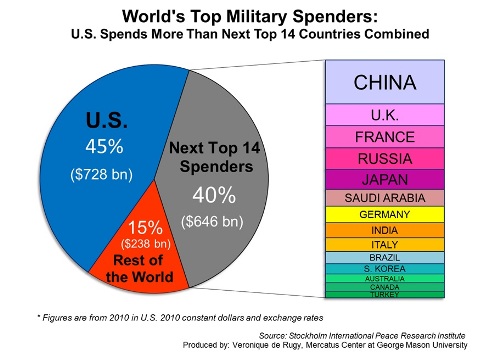Marwa Daoudy has a piece at Al Jazeera titled “The Case Against Military Intervention in Syria” and it is an important read throughout. But the segment I found most instructive was the part describing the incredible pressure towards a U.S. intervention coming from elite foreign policy circles in Washington:
Published on December 14, 2011, a report by the Washington Institute for Near East Policy, a foreign policy neoconservative think-tank, provides an “assessment of military intervention in Syria”. The authors, a visiting fellow from the US Air Force and two military and security affairs specialists, identify the risks and challenges of different covert and overt operations, whilst evaluating Iran’s response.
On December 21, 2011, an open letter was sent to President Obama, advocating the adoption of “crippling multilaterally-based sanctions on the Syrian government”, “increasing the capabilities” of “anti-regime Syrian groups… whose political goals accord with US national security interests” and finally “working with Turkey and other partners to establish safe havens in Syria, as well as no-go zones for the Assad regime’s security forces to protect civilians”.
The paper sought to impose “crippling sanctions” on the Syrian government and provide assistance to opposition groups and impose no-fly/no-go zones in Syria. Foreign Policy Initiative is the successor of the New American Century, a group that has successfully advocated for the Iraq War, with well-known neoconservative pundits such as Robert Kagan, William Kristol, Dan Senor and Douglas Feith, the former Under Secretary of Defence for Policy in the Bush administration and the mind behind the war on terror, US military prisons in Iraq and the Administration’s special relations with right-wing parties in Israel.The letter was drafted by the Foreign Policy Initiative, another Washington-based think-tank that has regularly called for a greater US role in the Syrian crisis. Interestingly enough, on November 8, 2011, the same foundation issued a joint paper with the Foundation for the Defence of Democracies which outlined “policy options for the US and like-minded nations to further assist the anti-regime opposition”.
The petition submitted to President Obama was signed by the latter, in addition to Tony Badran from the Foundation for the Defence of Democracies, Paul Bremer, the diplomat in charge of overseeing Iraq’s occupation after the 2003 invasion, Representative Eliot Engel, sponsor of the Syria Accountability Act of 2003… and a few US-based Syrian expatriates. It appears that the US National Security Council has already been instructed to look into different options for American intervention in Syria. In addition to humanitarian corridors, these would include the establishment of safe zones through military action.
The long-term goal is clearly strategic: to tame Syria as a key regional player by seizing this moment of internal instability in order to shape the country’s geopolitical links.
Journalists and international monitors have largely been absent during the violence in Syria, resulting in a lack of reliable or verifiable information on exactly what’s been going on, particularly regarding outside intervention from the U.S. and others. Early on, I wrote here about the troubling potential for Washington to make Syria its business, so to speak. One of the first reports in the mainstream on possible U.S. intervention came at the end of December from Josh Rogin at Foreign Policy. He explained that the Obama administration instructed the National Security Council to begin considering options for U.S. intervention in Syria, including what they called the “unlikely” option of setting up a no-fly zone. Then some others, including The Atlantic, reported on medicine, weapons, and fighters being smuggled into Syria primarily from Lebanon to assist the Syrian Free Army (Syrian Army defectors fighting security forces). This was in addition to the assistance the defectors were receiving from just over the border in Turkey, which has been known about from the beginning.
Other reports came out in the last months talking about potential covert actions working to undermine Assad and the Syrian opposition’s receipt of “training” and weapons from NATO sources and possibly former Libyan rebels. For this I’ve seen little hard evidence, but it’s certainly plausible (especially now that the Obama administration has decided to allow their media sources to know intervention has been on their minds). You can listen to Antiwar.com columnist and former CIA officer Philip Giraldi talk about these things here with Antiwar Radio host Scott Horton. Pepe Escobar talks about it here as well.
If substantial U.S. intervention in Syria has already taken place, the unintended consequences could be catastrophic, especially for the Syrian people. If the U.S. decides to intervene in the near future, the costs would be unspeakably high and would almost certainly turn into an effort to install another controllable despot in Damascus that conforms more closely to Washington’s dictates, as s0-called humanitarian interventions tend to go.




